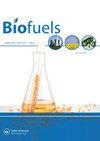A critical review on emulsion fuel formulation and its applicability in compression ignition engine
IF 2.6
4区 工程技术
Q3 ENERGY & FUELS
引用次数: 0
Abstract
AbstractThe introduction of emulsion fuels has attenuated the problem of emissions from diesel engines without any engine modification. Emulsion fuel provides improved combustion characteristics with comparable or slightly reduced engine performance. This study presents a critical review of the research conducted on emulsion fuel technology concentrating on emulsion formulation techniques, emulsion stability, and its implications on engine performance and engine emissions. It is observed from the literature that the mixing process affects the particle size of the emulsion, which in turn influences emulsion stability. The presence of a polar solvent induces secondary atomization, which stimulates the micro-explosion phenomenon, increasing combustion efficiency. However, the decrease in combustion temperature with the addition of polar solvent limits its concentration. In addition, the accumulation of polar solvent reduces emissions, but it can have an adverse effect on the combustion phenomenon. The exergy analysis of emulsion fuel use in engines reveals opportunities for enhanced exergy efficiency. Appropriate selection of fuel components tends to improve exergetic efficiency. Future research on emulsion fuel can focus on improved fuel formulation technologies, engine endurance studies, and the long-term effect of the micro explosion phenomenon.Keywords: Microemulsionsurfactantstabilitybiofuelemission Disclosure statementThe authors report there are no competing interests to declare.乳化液燃料配方及其在压缩点火发动机上的适用性综述
摘要乳化燃料的引入减轻了柴油发动机的排放问题,而无需对发动机进行任何改造。乳化燃料提供了改善的燃烧特性与相当或略有下降的发动机性能。本研究对乳化液燃料技术的研究进行了综述,重点介绍了乳化液配方技术、乳化液稳定性及其对发动机性能和排放的影响。从文献中观察到,混合过程会影响乳液的粒径,进而影响乳液的稳定性。极性溶剂的存在引起二次雾化,激发微爆炸现象,提高燃烧效率。然而,极性溶剂的加入降低了燃烧温度,限制了其浓度。此外,极性溶剂的积累减少了排放,但它可能对燃烧现象产生不利影响。对发动机中乳化液燃料使用的火用分析揭示了提高火用效率的机会。适当选择燃料成分有利于提高燃用效率。未来对乳化燃料的研究可以集中在改进燃料配方技术、发动机耐久性研究以及微爆炸现象的长期影响等方面。关键词:微乳液;表面活性剂;稳定性;生物燃料排放;
本文章由计算机程序翻译,如有差异,请以英文原文为准。
求助全文
约1分钟内获得全文
求助全文
来源期刊

Biofuels-Uk
Energy-Renewable Energy, Sustainability and the Environment
CiteScore
5.40
自引率
9.50%
发文量
56
期刊介绍:
Current energy systems need a vast transformation to meet the key demands of the 21st century: reduced environmental impact, economic viability and efficiency. An essential part of this energy revolution is bioenergy.
The movement towards widespread implementation of first generation biofuels is still in its infancy, requiring continued evaluation and improvement to be fully realised. Problems with current bioenergy strategies, for example competition over land use for food crops, do not yet have satisfactory solutions. The second generation of biofuels, based around cellulosic ethanol, are now in development and are opening up new possibilities for future energy generation. Recent advances in genetics have pioneered research into designer fuels and sources such as algae have been revealed as untapped bioenergy resources.
As global energy requirements change and grow, it is crucial that all aspects of the bioenergy production process are streamlined and improved, from the design of more efficient biorefineries to research into biohydrogen as an energy carrier. Current energy infrastructures need to be adapted and changed to fulfil the promises of biomass for power generation.
Biofuels provides a forum for all stakeholders in the bioenergy sector, featuring review articles, original research, commentaries, news, research and development spotlights, interviews with key opinion leaders and much more, with a view to establishing an international community of bioenergy communication.
As biofuel research continues at an unprecedented rate, the development of new feedstocks and improvements in bioenergy production processes provide the key to the transformation of biomass into a global energy resource. With the twin threats of climate change and depleted fossil fuel reserves looming, it is vitally important that research communities are mobilized to fully realize the potential of bioenergy.
 求助内容:
求助内容: 应助结果提醒方式:
应助结果提醒方式:


